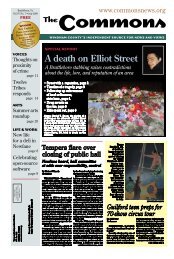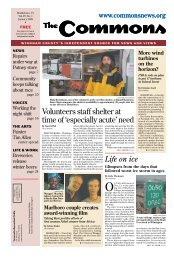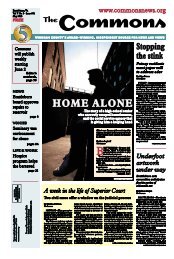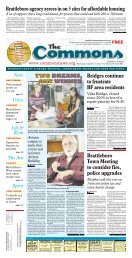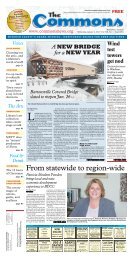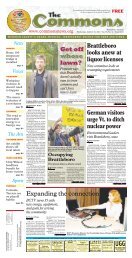The Commons
The Commons
The Commons
You also want an ePaper? Increase the reach of your titles
YUMPU automatically turns print PDFs into web optimized ePapers that Google loves.
6 NEWS <strong>The</strong> <strong>Commons</strong> • February 2009 <strong>The</strong> <strong>Commons</strong> • February 2009 NEWS 7<br />
n Pay as you throwfrom page 1<br />
dumping.<br />
With PAYT, also known as<br />
“unit-based pricing,” residents<br />
are charged individually, based<br />
on the amount of trash they<br />
throw away, instead of uniformly<br />
subsidizing the rubbish pickup<br />
and disposal process through<br />
their property taxes.<br />
Under the proposed scheme,<br />
Brattleboro residents would pay<br />
a fixed rate for special trash bags,<br />
which would be available at the<br />
town’s major grocery stores. <strong>The</strong><br />
actual retail price for each bag is<br />
not yet fixed and must be decided<br />
by the Selectboard if the plan<br />
goes ahead, at an estimated $2<br />
per 30-gallon bag.<br />
Currently, Brattleboro is one<br />
of only three municipalities in<br />
Vermont, along with Westminster<br />
and Vernon, whose residents<br />
benefit from curbside<br />
trash pickup. Even Burlington<br />
offers curbside pickup only for<br />
recyclables. In other towns, residents<br />
pay haulers directly or haul<br />
their own rubbish to a transfer<br />
station.<br />
Last year, the Westminster selectboard<br />
also discussed transitioning<br />
to a PAYT system.<br />
“It’s not the most green system,”<br />
said Brattleboro’s Public<br />
Works Director, Steve Barrett,<br />
who has served on the town’s<br />
Solid Waste Study Committee<br />
since 2006. Jane Southworth<br />
chairs the committee.<br />
Other members include Paul<br />
Pay-as-you-throw<br />
advantages<br />
• Equity – Customers who<br />
use more service pay more.<br />
• Economic signal – Behavior<br />
affects the bill so there is a<br />
recurring economic signal to<br />
modify behavior.<br />
• Lack of restrictions – Does<br />
not restrict customer choice.<br />
• Efficiency – Variable rate<br />
programs are generally inexpensive<br />
to implement.<br />
• Waste reduction – PAYT<br />
rewards all behaviors that reduce<br />
the amount of garbage<br />
thrown away.<br />
• Speed of implementation –<br />
PAYT programs can be quickly<br />
put into place.<br />
• Flexibility – PAYT programs<br />
can be implemented with<br />
a range of arrangements.<br />
• Environmental benefits<br />
Cameron, director of Brattleboro<br />
Climate Protection; Harold<br />
Dompier, a former member of<br />
the Selectboard; Brenda Emery,<br />
who coordinates accounts payable<br />
in the town finance department,<br />
and John Fay, a program<br />
director with the Windham Solid<br />
Waste Management District, a<br />
cooperative program to manage<br />
recycling and hazardous waste<br />
collection programs in the county<br />
and to manage the now-closed regional<br />
landfill.<br />
“Basically we’re chucking everything<br />
away, and we have a really<br />
low recycle rate” — between<br />
16-19 percent, Barrett said.<br />
Costs and benefits<br />
<strong>The</strong> PAYT subject was most<br />
recently broached during the<br />
Selectboard’s examination of the<br />
town’s budget, as board members<br />
looked for ways to keep<br />
costs down. <strong>The</strong> annual cost for<br />
curbside pickup of trash and recyclables<br />
is $962,000.<br />
PAYT would save approximately<br />
$300,000 annually, proponents<br />
say, preventing a predicted<br />
3.4-percent increase.<br />
<strong>The</strong> town stands to see savings<br />
in the form of reduced tipping<br />
fees, but in more prosperous<br />
times, the recyclable materials<br />
diverted from the waste stream<br />
could have been sold as well.<br />
However, because of the everlooming<br />
economic recession,<br />
the recycling industry at large<br />
– PAYT programs are beneficial<br />
to the environment.<br />
Pay-as-you-throw<br />
concerns<br />
• Illegal dumping – Research<br />
shows illegal dumping is a bigger<br />
fear than reality, and is a<br />
problem in about 20 percent<br />
of communities — a problem<br />
that lasts about three months<br />
or less. Composition of illegally<br />
dumped material finds<br />
only about 15 percent is household<br />
and the largest household<br />
component is bulky items or<br />
appliances.<br />
• Concerns about large families<br />
or low income – Large families<br />
pay more for groceries,<br />
water and other services. PAYT<br />
extends this to trash. For lowincome,<br />
in some cases, communities<br />
provide discounts for<br />
ALWAYS FRESH, ALWAYS HOMEMADE<br />
EVERY FRIDAY & SATURDAY<br />
AUTHENTIC MEXICAN MENU<br />
AND PRIME RIB<br />
Trash awaits pickup in Brattleboro in January.<br />
is at risk. <strong>The</strong> price of recyclables<br />
continues to drop because<br />
of the declining demand at home<br />
and abroad.<br />
With food waste constituting<br />
21 percent of all residential<br />
waste, according to a 2007 report<br />
on Vermont Waste Prevention by<br />
DSM Environmental Services,<br />
Cameron encourages residents<br />
to compost more.<br />
“You can bring your compost<br />
to Windham Solid Waste now,”<br />
said Cameron, “I certainly support<br />
people having composters<br />
essential services like energy<br />
and telephone. <strong>The</strong>se types of<br />
discounts could be extended to<br />
garbage fees.<br />
• Revenue uncertainties –<br />
the number of bags or containers<br />
set out decreases with PAYT<br />
so communities need to adjust<br />
rates accordingly.<br />
• Administrative burdens –<br />
Workloads during implementation<br />
will be increased.<br />
• Multi-family buildings –<br />
PAYT is most tested in single<br />
family situations, up to perhaps<br />
8-unit complexes. Multi-family<br />
buildings serviced by dumpsters<br />
receive a better volumebased<br />
building-wide incentive<br />
for recycling than single family<br />
households.<br />
From the Brattleboro Solid<br />
Waste Committee.<br />
in their backyard; those can be<br />
purchased through Windham<br />
Solid Waste.”<br />
But for renters in Brattleboro<br />
who cannot compost because of a<br />
lack of space or permission from<br />
building owners to do so, the<br />
time, energy and money spent<br />
disposing of their food wastes at<br />
Windham Solid Waste could end<br />
up being just as costly to them as<br />
throwing the food waste away.<br />
‘Everything was<br />
on the table’<br />
Selectman Rich Garant originally<br />
voted in favor of PAYT back<br />
in November. “When it was first<br />
voted on, I voted yes because<br />
there was such an emphasis on<br />
recycling.” But Garant became<br />
the only board member to vote<br />
against the new scheme in January,<br />
questioning whether this<br />
leveling of the budget was necessary<br />
at all.<br />
“It was never explained why an<br />
increase of 3.4 percent was unacceptable,”<br />
Garant said. “It’s not a<br />
problem with funds. <strong>The</strong> board<br />
only did it to make the budget<br />
look good. That was the driving<br />
factor.”<br />
<strong>The</strong> board also briefly considered<br />
other options, including doing<br />
away with curbside pickup<br />
altogether.<br />
“Everything was on the table,”<br />
said Dick DeGray, Selectboard<br />
chairman. “But that would have<br />
been too much of a pill for people<br />
Dotties<br />
DISCOUNT FOODS<br />
New Location!<br />
Bigger! Better!<br />
More Product!<br />
EBT Friendly<br />
10% Senior Discount<br />
every Wednesday<br />
Dottie’s Discount Foods<br />
77 Flat St., Brattleboro<br />
Next Door to Experienced Goods<br />
Open 9–7 Daily<br />
‘<br />
to swallow.”<br />
<strong>The</strong> town’s Solid Waste Committee<br />
lent its expertise to the<br />
decisionmaking process and<br />
advised the board with a presentation<br />
of relevant options.<br />
Committee volunteers research<br />
waste-management issues and<br />
offer recommendations to the<br />
Selectboard.<br />
Eventually, PAYT was deemed<br />
the best option, primarily because<br />
of the<br />
projected<br />
reduction<br />
in the town<br />
budget,<br />
but also<br />
because of<br />
sustainability<br />
and environmental<br />
benefits.<br />
“We currently<br />
pay<br />
DAVID SHAW/THE COMMONS<br />
Garant<br />
$85 dollars for every ton of rubbish<br />
that goes out of town,” Barrett<br />
said. “PAYT offsets that<br />
tipping fee.”<br />
In theory, it also creates a<br />
fairer system in which residents<br />
who recycle and produce less<br />
waste will no longer subsidize<br />
the behavior of their less conscientious<br />
neighbors.<br />
As of January, Brattleboro’s<br />
recycling rate stood at 17 percent,<br />
leaving ample room for<br />
improvement.<br />
<strong>The</strong> Solid Waste Committee<br />
also referenced a national study<br />
on PAYT by Duke University,<br />
which found an average 14-to-27-<br />
percent reduction in waste and a<br />
recycling increase from 32 to 59<br />
percent in towns that had implemented<br />
the scheme.<br />
<strong>The</strong> committee also looked at<br />
precedents from nearby towns<br />
that use PAYT, including Greenfield,<br />
Mass. and Hinsdale, N.H.<br />
With the amount residents pay<br />
for trash disposal depending directly<br />
on quantity, the committee<br />
says statistics show that the<br />
financial incentive spurs recycling<br />
rates.<br />
“It’s working out really well”<br />
for Greenfield, Southwor th<br />
said. “<strong>The</strong>y’re up to 41 percent<br />
recycling.”<br />
DeGray said the Selectboard<br />
put “$5,000 in the budget for [recycling]<br />
education,” before PAYT<br />
was voted in. As of now, curbside<br />
recycling pickup is still bi-weekly,<br />
when asked about changing to a<br />
weekly curbside pickup system<br />
DeGray hesitated, “there’s a<br />
significant cost increase there.”<br />
Burden on lowerincome<br />
residents<br />
With fewer bottles, cans, paper<br />
and cardboard in each trash<br />
bag, Brattleboro’s cumulative<br />
trash volume will drop and less<br />
money will be consumed by the<br />
town’s refuse collection fees to<br />
New Hampshire–based Waste<br />
Management, which manages<br />
the curbside pickup and contracts<br />
for the tipping of 3,667 tons<br />
(7,335,294 pounds) of trash.<br />
<strong>The</strong> town paid approximately<br />
$311,000<br />
per year in<br />
tipping fees<br />
each of the<br />
past three<br />
years, an<br />
a m o u n t<br />
that could<br />
be reduced<br />
by more<br />
DeGray<br />
aggressive<br />
recycling.<br />
A number<br />
of citizens have voiced their<br />
concerns since the policy was<br />
first proposed last fall, in the<br />
pages of the Reformer, on iBrattleboro.com,<br />
and at a Selectboard<br />
meeting in January.<br />
Many opponents have advocated<br />
on behalf of lower-income<br />
individuals, whose bag costs<br />
could create an untenable increase<br />
in their annual budget.<br />
Under PAYT, in residences<br />
with four or fewer units, the cost<br />
of waste disposal is passed from<br />
landlord to tenant, leaving tenants<br />
to absorb the cost.<br />
Garant — the only renter on<br />
the Selectboard — voiced the single<br />
“nay” in the January vote.<br />
“I don’t think it’s a responsible<br />
thing to shift the cost so clearly to<br />
the individual taxpayer and make<br />
no benefit to the community at<br />
large,” Garant said.”<br />
“I will be unable to afford the<br />
bags,” declared resident <strong>The</strong>resa<br />
Toney at the Selectboard<br />
meeting.<br />
“I certainly understand peoples’<br />
concerns,” said DeGray.<br />
“<strong>The</strong>re is going to be a cost<br />
shift.”<br />
Indeed, the reduction in taxes<br />
offered by PAYT will be exceeded<br />
by the annual cost of bags.<br />
“It’s actually going to cost<br />
people more money,” Barrett<br />
corroborated.<br />
However, in some instances,<br />
poorer families may not be required<br />
to pay for their own<br />
bags.<br />
“If you’re living in a dwelling<br />
with five families or more in it,”<br />
said DeGray, ”your landlord is<br />
supposed to be providing your<br />
trash pickup anyway.”<br />
<strong>The</strong> Solid Waste Committee<br />
has also been looking into obtaining<br />
vouchers for lower-income<br />
people, but ultimately the<br />
Selectboard will decide whether<br />
to offer them.<br />
Illegal dumping may also increase<br />
under the new system,<br />
opponents say. <strong>The</strong> Duke University<br />
study reveals that 19 percent<br />
of towns experienced a ‘slight increase’<br />
in dumping.<br />
Alternatives weighed<br />
A number of alternatives and<br />
additions to PAYT have been<br />
suggested. Most prominently,<br />
Rich Garant, Jane Southworth,<br />
and Steve Barrett have all voiced<br />
their support for a renewed recycling<br />
program and an increase in<br />
recycling education.<br />
“Recycling has gone down<br />
since the program started in<br />
the mid-90s,” said Southworth.<br />
“It has to do with the fact that<br />
the town had a paid part-time<br />
coordinator.”<br />
“We even had group leaders<br />
in all the neighborhoods,” said<br />
Mr. Barrett. “What happened<br />
was that, over the years, there<br />
was no money put in there for<br />
education.”<br />
A final decision will be made<br />
on PAYT at the town meeting<br />
this March. Although town representatives<br />
do not legally have<br />
the power to overrule the Selectboard’s<br />
decision, they do effectively<br />
hold the fiscal purse<br />
strings and can recommend that<br />
the $300,000 be reinserted into<br />
the budget.<br />
Although the Selectboard has<br />
the power to disregard the recommendation,<br />
“if they do put<br />
money back in, the Selectboard<br />
usually follows that request,”<br />
said DeGray.<br />
“I’m certainly willing to abide<br />
by what the town meeting reps<br />
want to do,” DeGray said. “But<br />
as I always say, let’s try this and<br />
see how it goes.”<br />
“If they want to go back to<br />
trash pickup, that’s what I’ll do,”<br />
he said.<br />
With additional reporting by<br />
Dane Kingsbury.<br />
DAVID SHAW/THE COMMONS<br />
Trash in Brattleboro, one of only three towns in the state of<br />
Vermont that offer their residents curbside pickup of refuse<br />
and recyclables.



